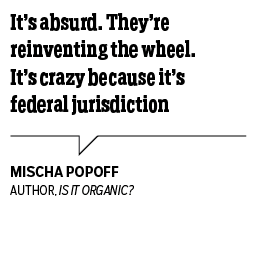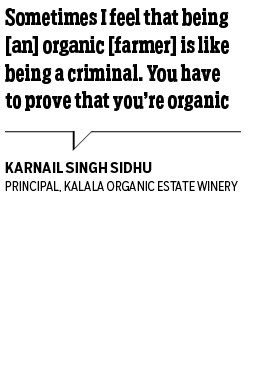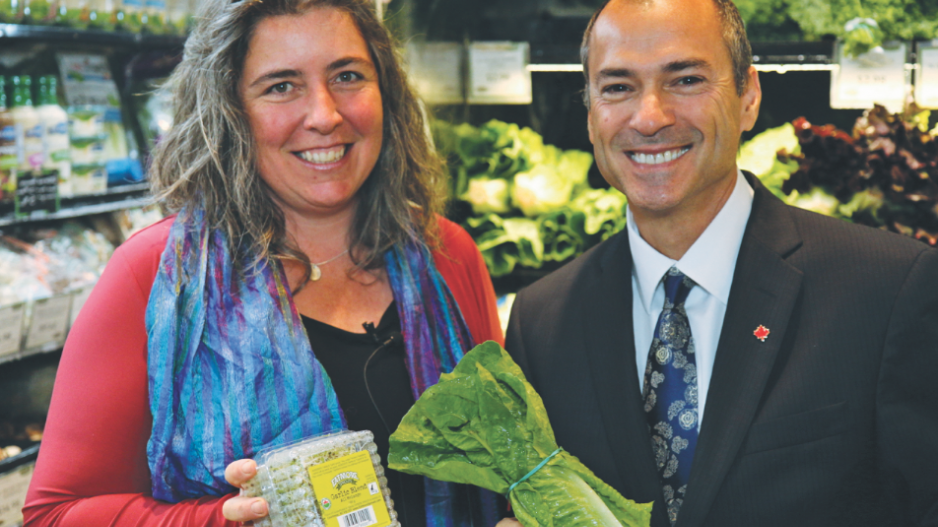Farmers and food manufacturers who use the word “organic” on products sold in B.C. will soon face tight restrictions to ensure that their products are, indeed, free of pesticides and other toxins.
Currently, there is little legal recourse if farmers market their products as organic even if pesticides have been used during their cultivation. The likely result is that the Canadian Food Inspection Agency (CFIA) would pull the products from shelves.
The new B.C. law, which passed the legislature unanimously on March 2, will govern a wide range of what Agriculture Minister Norm Letnick calls “protected labels.”
Letnick told Business in Vancouver that he wants regulations governing organic products to take effect starting in 2018.
NDP agriculture critic Lana Popham criticized the law for not containing the words “organic” or “certified organic” as well as for having a clause that enables the minister to exempt companies if he or she deems fit. Still, she voted for the bill.
Other critics, such as former organic farmer and Is It Organic? author Mischa Popoff, say a provincial law is unnecessary because the federal government already regulates what can be considered organic.
“It’s absurd,” he said. “They’re reinventing the wheel.”
Popoff equated a provincial organic regulatory regime to B.C. creating its own army.
“It’s crazy because it’s federal jurisdiction.”
But Popoff added that, although the CFIA can pull mislabelled products to stamp out fraudsters, it does not test organic products for authenticity in the same way that its inspectors monitor cattle ranches to guard against mad cow disease.

Letnick told BIV that the new law is a “framework” and that definitions for the words “organic” or “certified organic,” as well as how government will regulate the sector, will be in regulations that the government will draft in concert with the Certified Organic Associations of British Columbia (COABC).
“My guess is that the regulations will be public later this year or in early 2017 – long before they are needed to come into force in 2018,” he said.
Separate regulations could be written in future to cover other protected labels, such as, potentially, “100% B.C. wine” or “100% B.C. mushrooms.”
“There are some people out there who want to label their products as 100% B.C. wine even if they are not part of the BC VQA [British Columbia Vintners Quality Alliance],” Letnick said.
“They can make a submission to government to say that they would like to have a protected label that says ‘100% B.C. wine.’ If they are successful, we would work with them and draft additional regulations that would protect that particular protected label.”

BC VQA wines do not fall under the new law on protected labels because that designation is covered by the Agri-Food Choice and Quality Act and regulations related to that law.
Industry reaction to more regulation of organic products is mixed.
Carmen Wakeling, co-president of COABC and a principal at Eatmore Sprouts & Greens Ltd., told BIV that she is “excited” so far but that “the regulations are where the rubber will hit the road.”
Kalala Organic Estate Winery principal Karnail Singh Sidhu, meanwhile, dreads the new legislation.
“No, I’m not a big supporter of the bill,” he said. “Sometimes I feel that being [an] organic [farmer] is like being a criminal. You have to prove that you’re organic.
“There’s a lot of paperwork, and the people who are organic farmers are small businesses. It’s expensive. Why can’t we make it so all the farmers who are not organic, the ones who use chemicals that cause cancer, why don’t they have to write their chemicals on their labels?”
Sidhu said he applied in 2010 to have his vineyard certified as growing 100% organic grapes, and it took three years for him to gain that certification.
He thinks that, before 2018, he’ll have to embark on another process to certify that his winery – his winemaking processes – is also organic.
Currently, Sidhu has not made his winery certified organic because if he did he could no longer bottle non-organic wine for other winemakers who use different branded labels.
How the organic regulations will be enforced will be another point for debate.
Letnick said that explanation is expected to be part of the regulations. •




